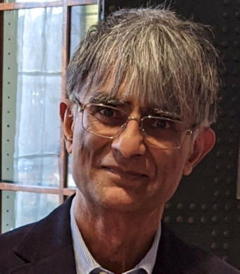Harshad Bhadeshia facts for kids
Quick facts for kids
Sir Harshad Bhadeshia
FRS FREng
|
|
|---|---|
 |
|
| Born |
Harshad Kumar Dharamshi Hansraj Bhadeshia
27 November 1953 |
| Other names | Harry Bhadeshia |
| Alma mater |
|
| Awards | Armourers and Brasiers' Company Prize (1997) Knight Bachelor (2015) |
| Scientific career | |
| Fields |
|
| Institutions | University of Cambridge, Queen Mary University of London |
| Thesis | Theory and significance of retained austenite in steels (1980) |
| Doctoral advisor | David V. Edmonds |
| Doctoral students | Roger Reed Rachel Thomson |
Sir Harshad "Harry" Bhadeshia is a famous Indian-British scientist who studies metals. He is known as a metallurgist, which means he works with metals and how they change. He was a professor at the University of Cambridge and joined Queen Mary University of London in 2022. He has done a lot of important research on steel, especially how it can be made stronger and better.
Contents
Early Life and School
Sir Harshad Bhadeshia was born in Kenya on November 27, 1953. His parents were carpenters. He became interested in science when he visited the battery shop where his father worked.
He went to Kongoni Primary School and then Highway Secondary School in Nairobi, Kenya. In 1970, his family moved to the United Kingdom.
Studying Metals
In the UK, he started working as a technician at a company called British Oxygen Company. This job allowed him to study part-time at East Ham College of Technology. He earned a certificate in science.
Later, he worked at Murex Welding Processes, which helped him study at the City of London Polytechnic. He earned his Bachelor of Science degree in 1976. A professor named Robert Honeycombe encouraged him to continue his studies at the University of Cambridge.
Sir Harshad earned his PhD from the University of Cambridge in 1980. His research focused on how steel changes its structure. He studied how atoms move and rearrange when steel is treated, especially during processes that make it stronger.
Career and Research
Sir Harshad's main work is about understanding how metals change their solid form. He especially focuses on different types of steel. His goal is to find new ways to create special metal alloys and processes that use fewer resources.
After getting his PhD, he became a research fellow and then joined the teaching staff at the University of Cambridge. He has written over 650 scientific papers and several books about metallurgy.
Making Stronger Steel
In the 1990s, he worked with British Steel plc. They developed a special type of steel called "bainitic steel." This steel was very strong and was used for the rails in the Channel Tunnel, which connects England and France. He also helped create a very strong armor steel for the British Ministry of Defence.
In 2006, he received the Bessemer Gold Medal for his amazing work in the steel industry. In 2008, he became the first Tata Steel Professor of Metallurgy at the University of Cambridge. He also led a research center with SKF, a company that makes bearings, to study steels used in bearings.
From 2005 to 2018, he helped create a special institute in South Korea called the Graduate Institute for Ferrous Technology. This institute focuses on studying iron and steel.
Teaching and Learning Resources
Sir Harshad has created many free learning materials about metallurgy and related subjects. He wants to make it easy for everyone to learn about metals.
What He Teaches
His teaching materials cover many topics, including:
- How crystals are formed in metals.
- Different types of metals and alloys.
- How steel changes its structure.
- The science behind how materials behave.
- How to use computers to model materials.
- Ethics in science.
These resources include notes, videos, books, and even cartoons. He has a YouTube channel called "bhadeshia123" with about 1300 educational videos. The British Library keeps these resources as a permanent record so they are always available for people to learn from. In 2007, he received an award for his excellent teaching.
Awards and Honors
Sir Harshad Bhadeshia has received many awards and honors for his contributions to science and engineering:
- 1992: Hume Rothery Prize
- 1994: Rosenhain Medal & Prize
- 1997: Royal Society Armourers and Brasiers' Company Prize
- 1998: Elected a Fellow of the Royal Society (FRS) – This means he is recognized as one of the UK's most distinguished scientists.
- 2002: Fellow of the Royal Academy of Engineering (FREng) – This is a high honor for engineers.
- 2006: Bessemer Gold Medal – A top award in the steel industry.
- 2008: Tata Steel Professor of Metallurgy
- 2015: Knight Bachelor – He was given the title "Sir" by the Queen.
- 2017: Adolf Martens Medal, Germany
- 2022: Henry Clifton Sorby Award
 | Lonnie Johnson |
 | Granville Woods |
 | Lewis Howard Latimer |
 | James West |

